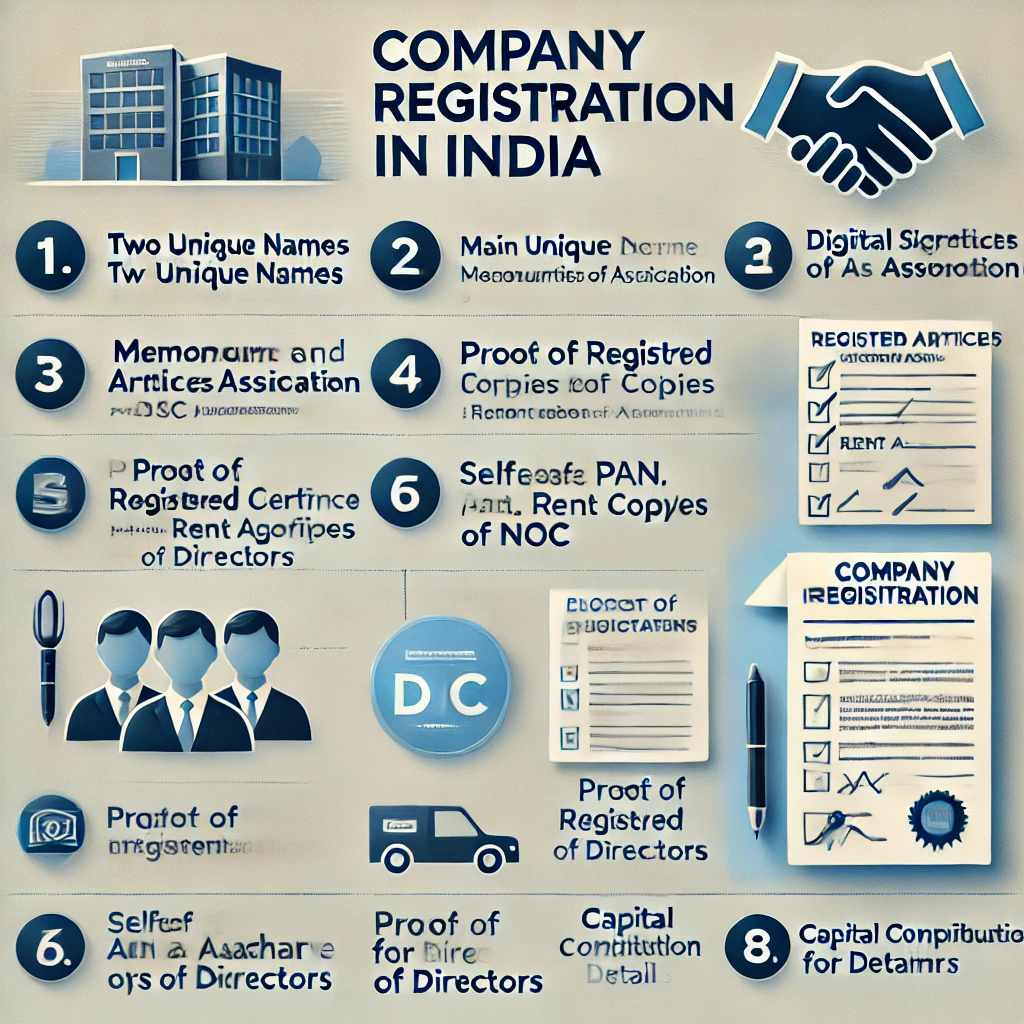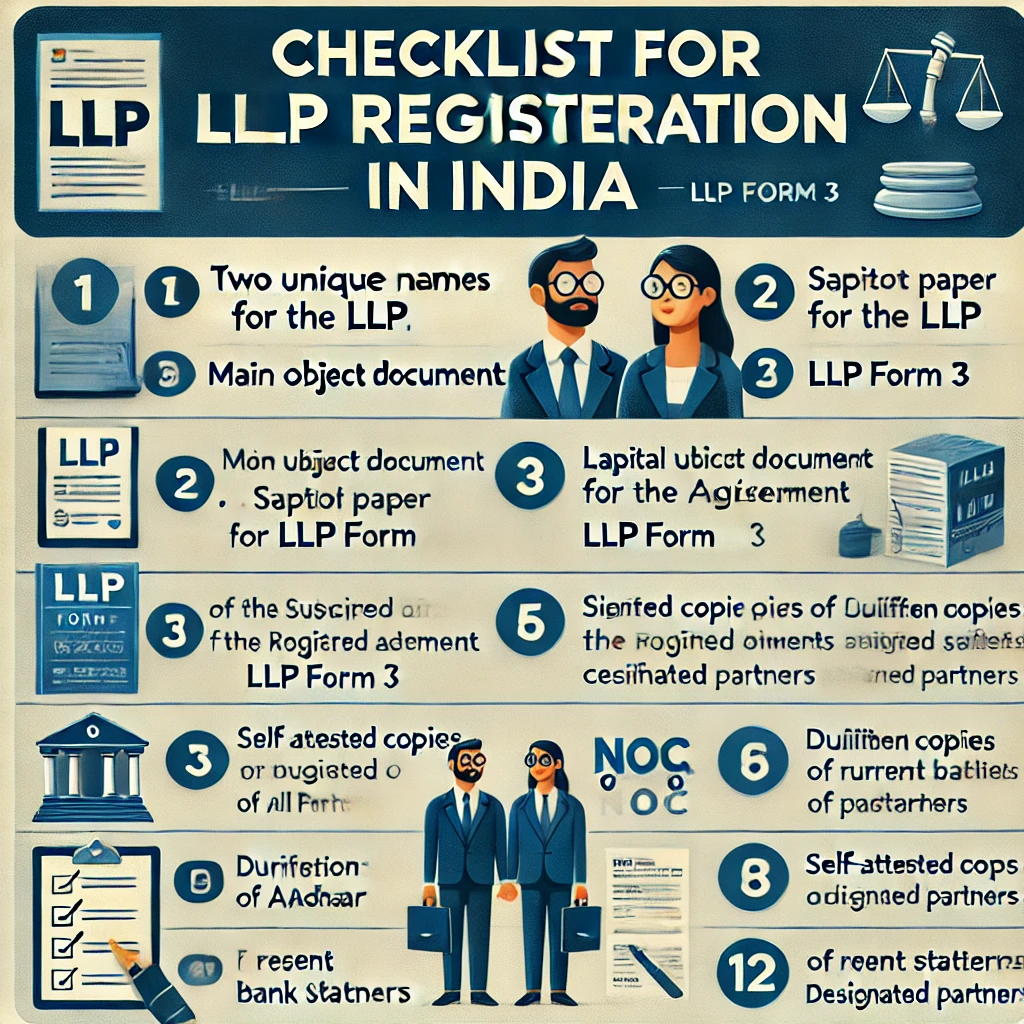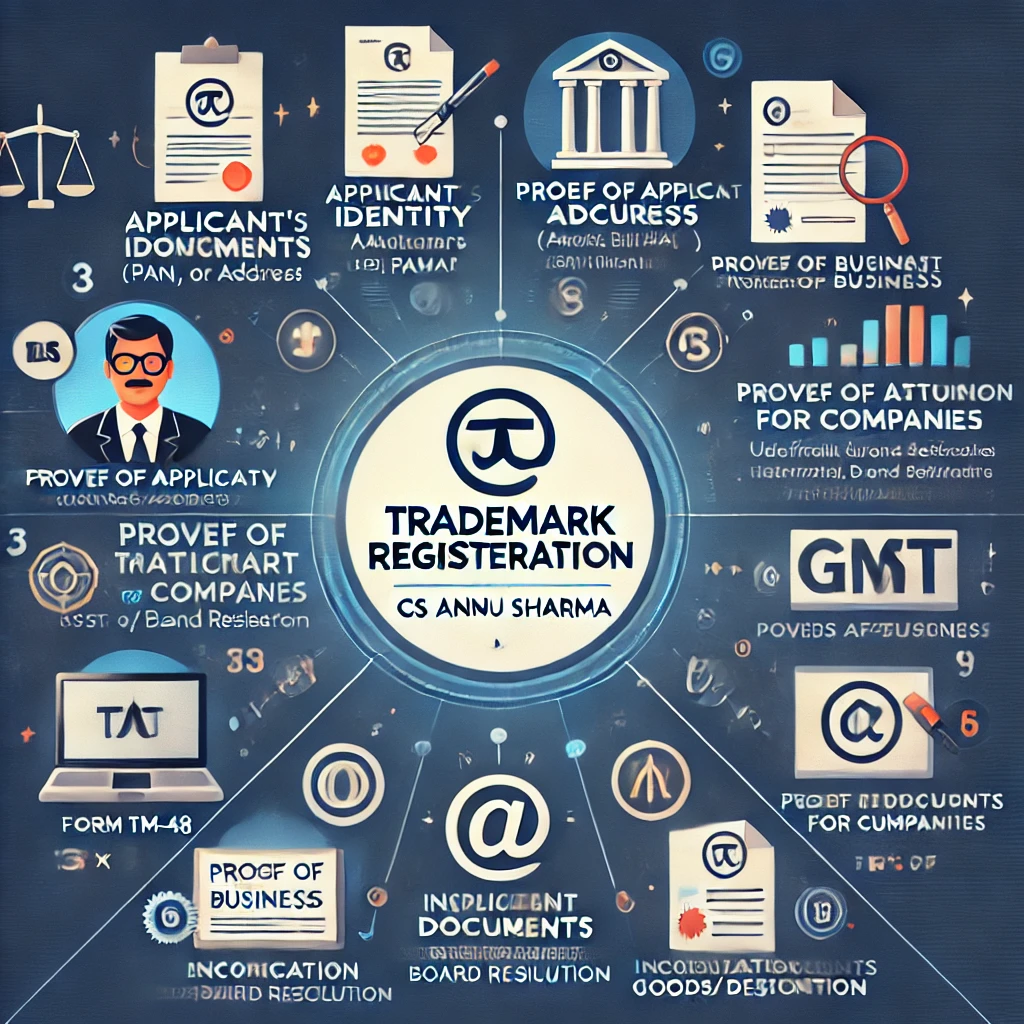Detailed Checklist For Company Registration in India
Detailed Checklist For Company Registration in India. Registering a Private Limited Company (PLC) in India requires submission of several essential documents. Each document serves a specific purpose in ensuring legal compliance, identifying stakeholders, and verifying operational legitimacy. Below is a comprehensive checklist of documents and their respective reasons:
Table of Contents
1. Proposed Names for the Company
- Requirement: Two unique names for the company.
- Reason: The name must be unique and compliant with the Companies Act, 2013. It is required for reservation of the name through the RUN (Reserve Unique Name) application filed with the Registrar of Companies (RoC).
2. Main Object Document of the Company
- Requirement: A brief document outlining the primary objectives and business activities of the company.
- Reason: This defines the company’s purpose and ensures alignment with the business activities permissible under Indian laws. It is included in the Memorandum of Association (MoA).
3. Memorandum of Association (MoA)
- Requirement: Defines the company’s scope of operations, objectives, and the relationship with shareholders.
- Reason: Legally required for incorporation, as it outlines the business framework and limits. Filed with the RoC.
4. Articles of Association (AoA)
- Requirement: A document specifying internal rules and regulations governing the company’s operations.
- Reason: It sets the operational framework, decision-making procedures, and management structure, forming a part of the company’s constitution.
5. Form DIR-2
- Requirement: A declaration from each proposed director confirming their willingness to act as a director.
- Reason: To ensure compliance with Section 152(5) of the Companies Act, 2013, and to record their consent.
6. Digital Signature Certificate (DSC)
- Requirement: A digital signature for authorized signatories.
- Reason: Mandatory for filing electronic documents with the Ministry of Corporate Affairs (MCA). It ensures the authenticity and security of submitted documents.
7. Identity Proof of Directors
- Requirement: Attested copy of PAN Card.
- Reason: PAN Card is mandatory for tax-related purposes and uniquely identifies Indian citizens involved in the company.
8. Address Proof of Directors
- Requirement: Attested copy of any one of the following:
- Aadhar Card
- Voter ID
- Driving License
- Passport
- Reason: These documents validate the identity and address of directors and are required for KYC compliance.

9. Residential Proof of Directors
- Requirement: Attested copy of any one of the following (not older than 2 months):
- Telephone Bill
- Mobile Bill
- Bank Statement
- Reason: To verify the residential address of directors for correspondence and compliance.
10. Proof of Registered Office
- Requirement:
- Rent Agreement, if the office is rented.
- Utility Bill (electricity, water, or gas) to confirm the address.
- No Objection Certificate (NOC) from the owner, if the property belongs to a director.
- Reason: To establish the physical location of the company’s headquarters and to comply with Section 12 of the Companies Act, 2013.
11. Personal Details of Directors
- Requirement:
- Place of birth.
- Duration of stay at their current address.
- Educational qualifications.
- Reason: These details are necessary for regulatory filings and background verification during the incorporation process.
12. Capital Contribution Details
- Requirement: Information about the amount of capital contributed by each shareholder and its bifurcation.
- Reason: Ensures compliance with Section 2(68) of the Companies Act, 2013, regarding the company’s capital structure. Required for issuance of shares.
13. Contact Information of Directors
- Requirement: Mobile number and email ID of all directors.
- Reason: For official communication and correspondence during and after the incorporation process.
Summary
This checklist ensures that all regulatory, legal, and compliance requirements are met for incorporating a Private Limited Company in India. Each document serves a critical role in establishing the company’s legal identity, operational framework, and stakeholder details. Adhering to these requirements ensures a smooth and transparent registration process under the guidelines of the Ministry of Corporate Affairs (MCA) and the Companies Act, 2013.
If you need templates for any forms or affidavits, feel free to ask!
Process for Registration of a Private Limited Company in India
Registering a Private Limited Company in India involves several steps under the framework of the Companies Act, 2013. While the process may seem straightforward, there are aspects that promoters might not be fully aware of. Below is the detailed step-by-step process, including lesser-known requirements and important facts.
Step 1: Creation of a Registered User Account on MCA Portal
- What to Do:
The first step is to create a registered user account on the Ministry of Corporate Affairs (MCA) portal (www.mca.gov.in). - Why It’s Required:
This account is mandatory for filing e-forms, submitting documents, and paying fees related to company incorporation. - Lesser-Known Fact:
Many promoters overlook the fact that they must register as a business user (not a regular user) to access advanced functionalities like incorporation filings.
Step 2: Obtain Digital Signature Certificate (DSC)
- What to Do:
All proposed directors must obtain a Digital Signature Certificate (DSC) from certifying authorities authorized by the Controller of Certifying Authorities (CCA). - Why It’s Required:
The DSC is necessary for signing e-forms electronically on the MCA portal, ensuring the authenticity of documents. - Lesser-Known Fact:
The DSC must be Class 3 or higher and linked to the director’s PAN card. Any mismatch in PAN and DSC details can lead to application rejections.
Step 3: Name Reservation (RUN Service)
- What to Do:
File the Reserve Unique Name (RUN) application on the MCA portal to reserve a unique company name.- Provide two unique name options.
- Ensure compliance with the Name Availability Guidelines, 2013.
- Why It’s Required:
The name must not conflict with existing company names or registered trademarks. - Lesser-Known Fact:
The Central Registration Centre (CRC), which approves the names, often rejects applications with generic or descriptive names. Promoters should conduct a thorough search in the MCA and trademark databases beforehand.
Step 4: Preparation of MOA and AOA
- What to Do:
Draft the Memorandum of Association (MOA) and Articles of Association (AOA), specifying:- MOA: Main objectives and scope of the company.
- AOA: Rules and regulations governing internal management.
- Why It’s Required:
These documents form the company’s constitution and are mandatory for incorporation. - Lesser-Known Fact:
- The MOA and AOA must be witnessed and certified by a professional (Company Secretary, Chartered Accountant, or Advocate).
- E-signatures of directors and subscribers are required, which must match the details provided in the incorporation forms.
Step 5: Filing SPICe+ Form
- What to Do:
The SPICe+ form (Simplified Proforma for Incorporating a Company Electronically Plus) is a single-window form for:- Company registration
- DIN (Director Identification Number) allocation
- PAN and TAN issuance
- GST registration (optional)
- EPFO and ESIC registrations
- Why It’s Required:
This integrated form streamlines the process and reduces repetitive filings across multiple authorities. - Lesser-Known Fact:
- A professional certification (by a CS, CA, or advocate) is mandatory for verifying SPICe+ forms.
- The details of capital contribution and shareholding must match exactly with the MOA.
Step 6: Filing AGILE-Pro S Form
- What to Do:
This form is used for obtaining additional registrations, such as:- GST
- ESIC (Employee State Insurance Corporation)
- EPFO (Employee Provident Fund Organization)
- Professional Tax (if applicable)
- Why It’s Required:
Ensures compliance with labor laws and tax regulations from the outset. - Lesser-Known Fact:
- GST registration through this form is optional but recommended if the company expects taxable turnover.
- The same professional certifying the SPICe+ form must also certify AGILE-Pro S.
Step 7: Submission of Supporting Documents
- What to Do:
Submit the following documents with SPICe+ and AGILE-Pro S forms:- Proof of registered office (utility bill, rent agreement, NOC, etc.).
- Identity and address proof of directors.
- Signed MOA and AOA.
- Why It’s Required:
To validate the details provided in the forms and establish the company’s legal identity. - Lesser-Known Fact:
- The registered office must be operational within 30 days of incorporation, as per Section 12 of the Companies Act, 2013.
- Any errors or mismatches in supporting documents often lead to resubmissions.
Step 8: Certificate of Incorporation (COI)
- What to Do:
Once all documents and forms are approved, the RoC issues the Certificate of Incorporation (COI), containing:- Company Identification Number (CIN)
- PAN and TAN
- Why It’s Required:
This is the final step that legally recognizes the company as a corporate entity. - Lesser-Known Fact:
- The COI also serves as proof of PAN and TAN issuance, which eliminates the need for separate physical applications.
Step 9: Opening a Bank Account
- What to Do:
Use the COI, MOA, AOA, and KYC documents of directors to open a company bank account. - Why It’s Required:
A dedicated company bank account is mandatory for maintaining proper financial records and compliance. - Lesser-Known Fact:
Banks may require a board resolution for account opening, even for newly incorporated companies.
Key Takeaways
- Professional Certification: Several steps (e.g., MOA/AOA witnessing, SPICe+ form submission) require certification by a Company Secretary, Chartered Accountant, or Advocate. This step is often overlooked by promoters.
- DSC Linking: DSC details must match the PAN and Aadhaar details; discrepancies can delay the process.
- Witnessing MOA/AOA: Professional certification and e-signatures for MOA and AOA are compulsory.
- Integrated Process: SPICe+ allows incorporation, DIN, PAN, TAN, and GST registration in one go, reducing time and effort.
By adhering to this structured process and paying attention to lesser-known requirements, promoters can ensure a seamless incorporation experience.
Checklist of Documents Required for Registration of an LLP in India
Registering a Limited Liability Partnership (LLP) in India involves submission of various documents for compliance with the Limited Liability Partnership Act, 2008. Below is a detailed checklist of the required documents, along with reasons for their submission:

General Documents
- Two Unique Names for the LLP
- Why It’s Required:
To ensure the proposed LLP name is unique and compliant with the naming guidelines of the Ministry of Corporate Affairs (MCA). The name reservation is done through the RUN-LLP service.
- Why It’s Required:
- Main Object Document
- Why It’s Required:
To specify the business activities the LLP intends to carry out, ensuring alignment with its objectives under the Act.
- Why It’s Required:
- Passport Size Photograph
- Why It’s Required:
For identity verification of designated partners (DPs) during the registration process.
- Why It’s Required:
- Stamp Paper for Filing Form LLP-3
- Why It’s Required:
Required for executing the LLP Agreement, which governs the roles, responsibilities, and capital-sharing ratios among partners.
- Why It’s Required:
Registered Office Proof
- Latest Electricity Bill of the Registered Office
- Why It’s Required:
To establish proof of the address that will serve as the LLP’s registered office.
- Why It’s Required:
- No Objection Certificate (NOC) for Registered Office
- Why It’s Required:
If the registered office is not owned by the LLP or its partners, a NOC from the owner is required to use the premises.
- Why It’s Required:
Partner-Specific Information
- Capital Sharing Ratio of All Partners
- Why It’s Required:
To specify the agreed-upon profit-sharing and contribution ratio among the partners, as part of the LLP Agreement.
- Why It’s Required:
- Qualification of All Designated Partners (DPs)
- Why It’s Required:
For compliance and background verification of designated partners.
- Why It’s Required:
- Duration of Stay at Current Address
- Why It’s Required:
To complete the KYC process and verify the residential stability of the partners.
- Why It’s Required:
- Mobile Number and Email ID of All Designated Partners
- Why It’s Required:
For official communication and registration purposes.
- Why It’s Required:
Subscriber Sheet
- Signed Copy of Subscriber Sheet
- Why It’s Required:
This document contains details of the designated partners and their consent to form the LLP. - Professional Certification:
The subscriber sheet must be certified by a professional (CS/CA/CWA/Advocate).
- Why It’s Required:
Professional Certification Documents
- Self-Attested Copy of PAN of All DPs
- Why It’s Required:
PAN is mandatory for tax registration and serves as the primary identity proof for Indian citizens.
- Why It’s Required:
- Self-Attested Copy of Aadhar of All DPs
- Why It’s Required:
Aadhar serves as additional proof of identity and address for the designated partners.
- Why It’s Required:
- Self-Attested Copy of Bank Statement of All DPs
- Why It’s Required:
For address verification and financial background checks of the designated partners. - Important Note:
The bank statement must be recent (not older than two months) and clearly display the partner’s name and address.
- Why It’s Required:
Process Notes
- Professional Certification:
Several documents, including the Subscriber Sheet, PAN, Aadhar, and Bank Statements, must be certified by a qualified professional (Company Secretary, Chartered Accountant, Cost Accountant, or Advocate). This ensures the authenticity of the documents and compliance with the MCA’s requirements. - LLP Agreement (Form LLP-3):
The LLP Agreement, executed on stamp paper, must be filed within 30 days of incorporation to define the operational and financial framework.
Summary
This checklist covers all required documents for registering an LLP in India, ensuring compliance with legal and operational requirements. Following this list precisely will streamline the registration process and avoid delays caused by incomplete documentation. If you need help drafting any forms or agreements, feel free to ask!
Checklist of Documents Required for Registration of a Trademark in India
Trademark registration in India is governed by the Trade Marks Act, 1999. It helps protect a brand’s identity, logo, name, or other distinctive signs. Below is a detailed checklist of documents required for registering a trademark in India, along with reasons for their submission.

1. Applicant’s Identity Documents
- Requirement:
- For Individuals/Proprietors:
- PAN Card
- Aadhaar Card
- Voter ID/Passport/Driving License
- For Companies/Firms:
- Incorporation Certificate
- Partnership Deed (for partnerships)
- PAN of the entity
- For Individuals/Proprietors:
- Reason:
To establish the legal identity of the applicant filing for the trademark.
2. Proof of Applicant’s Address
- Requirement:
- Utility Bill (electricity, water, or gas)
- Bank Statement
- Reason:
To verify the applicant’s address and for official communication.
3. Trademark Details
- Requirement:
- Logo, symbol, wordmark, or combination being trademarked (in JPEG or PNG format).
- Tagline or slogan (if applicable).
- Reason:
The exact representation of the trademark is required to publish it in the Trademark Journal for public scrutiny and opposition, if any.
4. Power of Attorney (Form TM-48)
- Requirement:
A signed Power of Attorney authorizing a trademark agent or attorney to file the application on behalf of the applicant. - Reason:
To give legal authority to a trademark professional to act on behalf of the applicant for registration, objections, or hearings.
5. Proof of Business
- Requirement (if applicable):
- GST Certificate
- MSME Registration Certificate
- Start-up Certificate (if the applicant is a start-up).
- Reason:
To validate the business status and claim reduced trademark application fees (for MSMEs and start-ups).
6. Specimen of the Trademark
- Requirement:
- A clear depiction of the trademark in JPEG format, 200×200 pixels.
- Reason:
To ensure proper representation of the trademark for examination and publication.
7. Class of Trademark
- Requirement:
Details of the Class(es) under which the trademark is to be registered (as per the NICE Classification). - Reason:
To identify the specific goods/services the trademark will protect. The NICE Classification includes 45 classes, covering various industries.
8. User Affidavit (if claiming prior use)
- Requirement:
A Notarized Affidavit specifying the date of first use and proof of usage, such as:- Invoices
- Advertisements
- Website screenshots.
- Reason:
To establish ownership of the trademark if it has been used prior to the application.
9. Incorporation Documents (for Companies)
- Requirement:
- Certificate of Incorporation
- Board Resolution authorizing a person to file the trademark.
- Reason:
To confirm the entity’s existence and authorized representation for filing.
10. Goods/Services Description
- Requirement:
A precise description of goods or services the trademark applies to. - Reason:
To define the scope of the trademark and ensure proper classification.
11. Proof of Payment
- Requirement:
Receipt of payment for the trademark application fee. - Reason:
Required as evidence of payment to avoid delays in processing the application.
Optional Documents (if applicable)
- NOC from Existing Trademark Owner:
If the trademark is similar to an existing one, obtain a No Objection Certificate from the owner. - Translation/Transliteration Certificate:
For non-English/Hindi trademarks, a certified translation/transliteration must be submitted.
Important Notes
- Trademark Representation:
Ensure the trademark’s design, color, and text are represented exactly as they will be used commercially. - Classification:
Choose the appropriate class(es) carefully to avoid limitations in trademark protection. - Professional Assistance:
Engaging a trademark agent or attorney ensures accurate filing and handling of objections or opposition proceedings, if any. - Fee Variations:
Application fees vary depending on the type of applicant:- ₹4,500 for individuals, MSMEs, and start-ups.
- ₹9,000 for companies or large businesses (per class).
Summary
Having the correct documents ready ensures a smooth trademark registration process. Protecting your trademark secures your brand’s identity and prevents unauthorized usage by others. If you need help with drafting forms or filing applications, feel free to ask!
